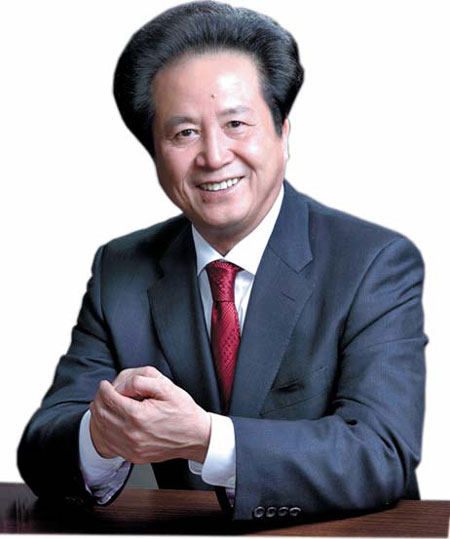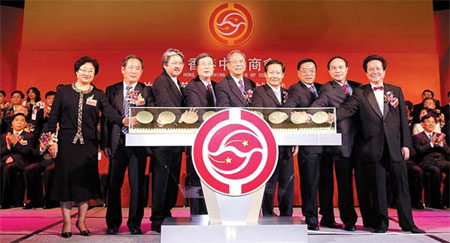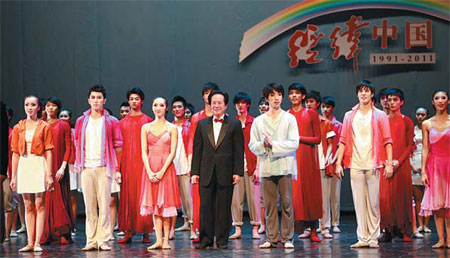Reason for being
Updated: 2014-01-26 07:25
By Zhang Zhao(China Daily)
|
|||||||
Company's purpose is to give back, says CEO
For Chan Kingwai, chairman of the Hong Kong King Wai Group, social responsibility is not an extra burden on a company - it is the reason for its existence.
Born in 1948 in Shantou, Guangdong province, Chan opened his first company in a local residential community when he was 24, becoming the manager of one of the first privately owned enterprises to be established in the era of Reform and Opening Up. That company provided more than 300 jobs.
In 1979, he settled down in Hong Kong and founded King Wai Group four years later.
When the economic downturn hit China in 1989, many overseas investors were wary of the business climate in the country, but Chan was confident enough to invest more than $100 million in the Chinese mainland in the fields of textiles and international trade.
Thanks to the world-class artificial silk production lines he introduced, his company not only took the leading position in the domestic market but also promoted the upgrading of the entire Chinese chemical fiber industry.
Over the past two decades, King Wai Group has expanded its businesses to real estate, finance, e-business and logistics.
In addition to caring about the growth of the company, Chan also stresses the public welfare.
Saving land and recycling energy are some of the features of Chan's real estate projects, because he believes that building an energy-saving and ecofriendly society is a major task in the national strategy, and a company must take its social responsibility to restore the economy.
For more than 20 years, he has been sponsoring education and charity.
He donated 10 million yuan ($1.7 million) to China Foreign Affairs University in 2012 as a fund to encourage its graduates to start their own businesses. He also donated 16 million yuan to Renmin University of China in 2013.
When earthquakes struck Sichuan province in 2008 and 2010, Chan donated HK$2 million ($257,800) to each of the quake-hit areas. He was one of the first Hong Kong entrepreneurs to donate each time.
He has altogether donated more than 400 million yuan since King Wai Group was founded.
"Taking social responsibility helps a company find its true value," he said. "It will not interfere with the company's development but rather win more opportunities for its growth."
Chan also has been thinking about the progress of the nation's reform and opening-up. He organizes seminars nearly every week, inviting scholars to share views on the related issues.
In the past five years he has given more than 100 speeches on forums. His topics include the development of privately owned companies, a national credit-risk management system, introduction of overseas capital, global strategies for Chinese companies, financing solutions for small and mid-sized enterprises, and ecology in the real estate industry.
Also serving as a member of the Chinese People's Political Consultative Conference National Committee and vice-chairman of the All-China Federation of Industry and Commerce, he has been offering advice to guide national development.
During the global economic crisis in 2008, Chan suggested to establish special banks for small and mid-sized companies to offer financing. That suggestion was widely hailed by industry insiders.
He said the ACFIC should take a leading role in establishing funds to serve the startups, using market operations of banks.
According to Chan's research, the lack of credit causes great economic losses to the nation, so he studied the development of social credit management systems and gave a speech on that topic at a meeting of the CPPCC in March 2009, which attracted attention of top decision-makers.
The CPPCC organized a research tour two months later in Shanghai and Hunan on the subject.
Another proposal he submitted to the meeting that year was to have a pavilion of privately owned Chinese enterprises in the Shanghai World Expo, which was realized in 2010.
As part of the nation's 12th Five-Year Plan (2011-15), the Chinese government unveiled a "go global" strategy encouraging competitive domestic companies to expand their business abroad. And Chan has been an advocate of the strategy.
He believes that Hong Kong is a good platform for mainland companies to start their international development.
Supported by the ACFIC and the Hong Kong SAR government, the Hong Kong China Chamber of Commerce was founded in August 2009, with Chan as its first president.
With the aim of "serving the country, prospering Hong Kong, and benefiting the world", the chamber organized the first China Overseas Investment Summit in 2011, against the context of the proposal to accelerate the implementation of the "go global" strategy.
The event attracted more than 8,600 people from around the world, including some 1,000 government officials, scholars, entrepreneurs and overseas Chinese community leaders.
The second summit in 2012 selected a number of best examples of successful overseas investment.
Delegates from successful Chinese transnational companies shared experiences about investing overseas.
"I might not be considered a successful businessman," he said. "I just do what a Chinese entrepreneur is asked to do."
zhangzhao@chinadaily.com.cn
|
Chan Kingwai, chairman of the Hong Kong King Wai Group. |
|
Chan Kingwai attends his inauguration ceremony as the first president of the Hong Kong China Chamber of Commerce in 2009. Provided to China Daily |
|
Chan attended an event to celebrate the achievements Hong Kong King Wai Group has made on the market of Chinese mainland. |
(China Daily 01/26/2014 page6)


